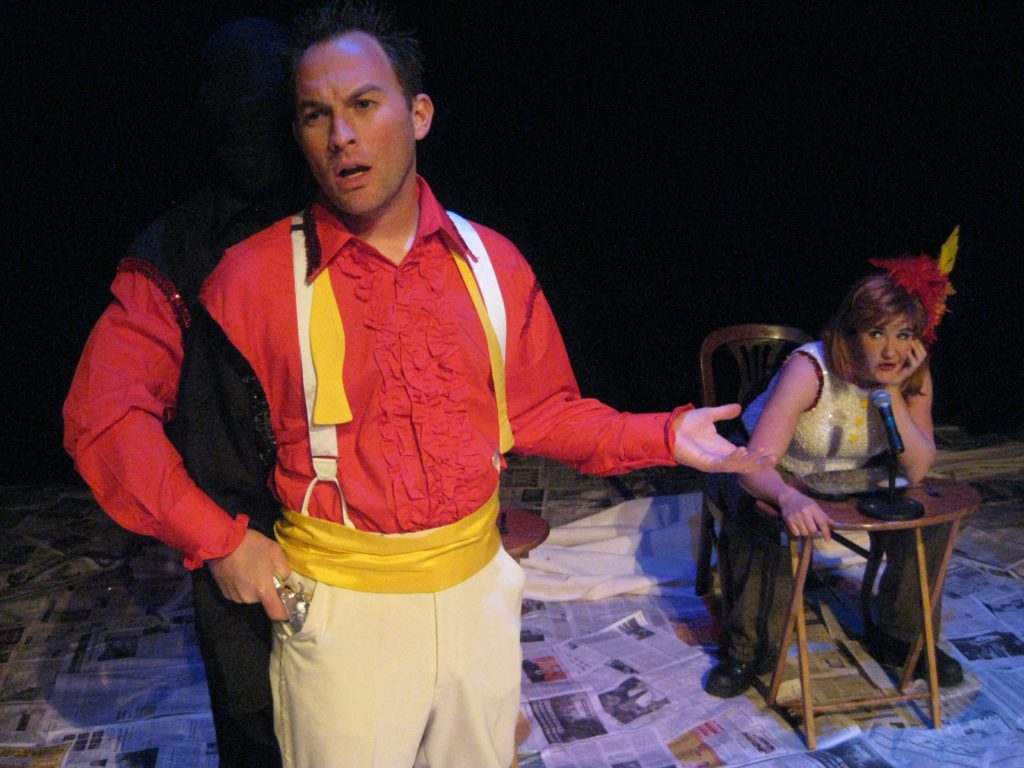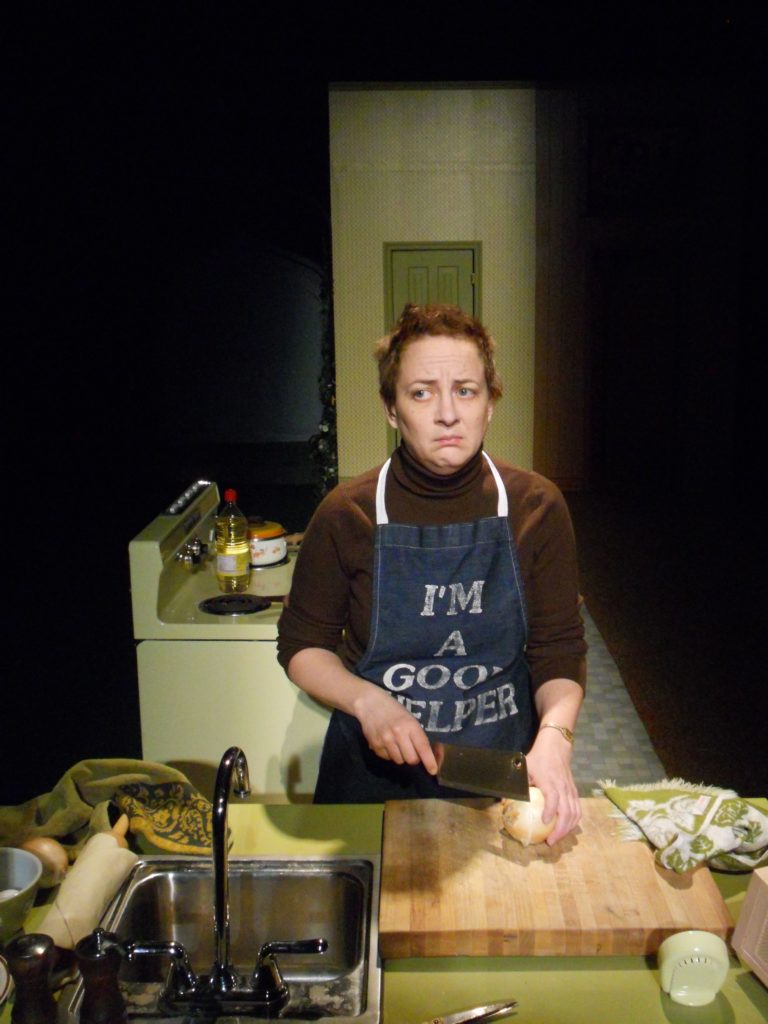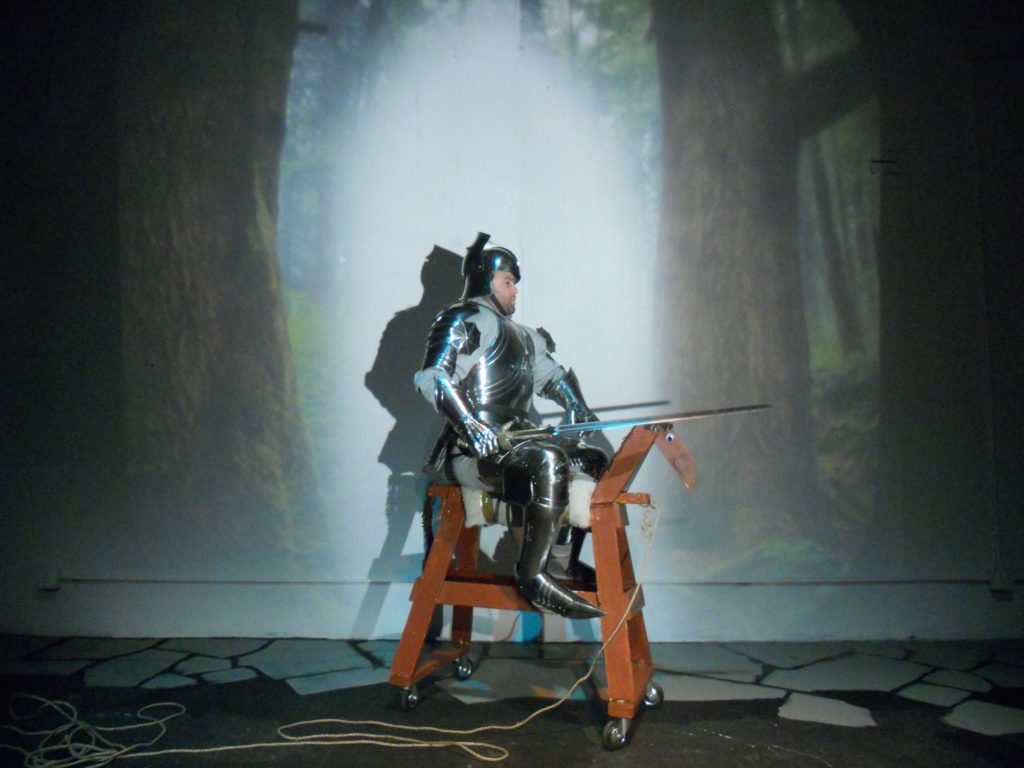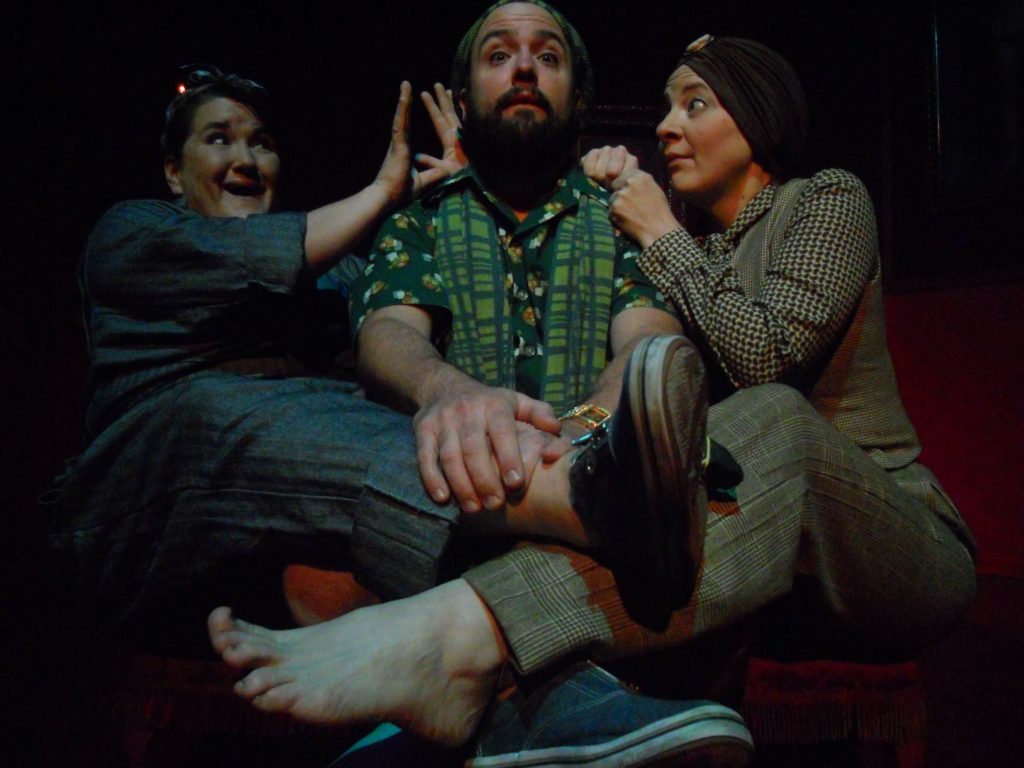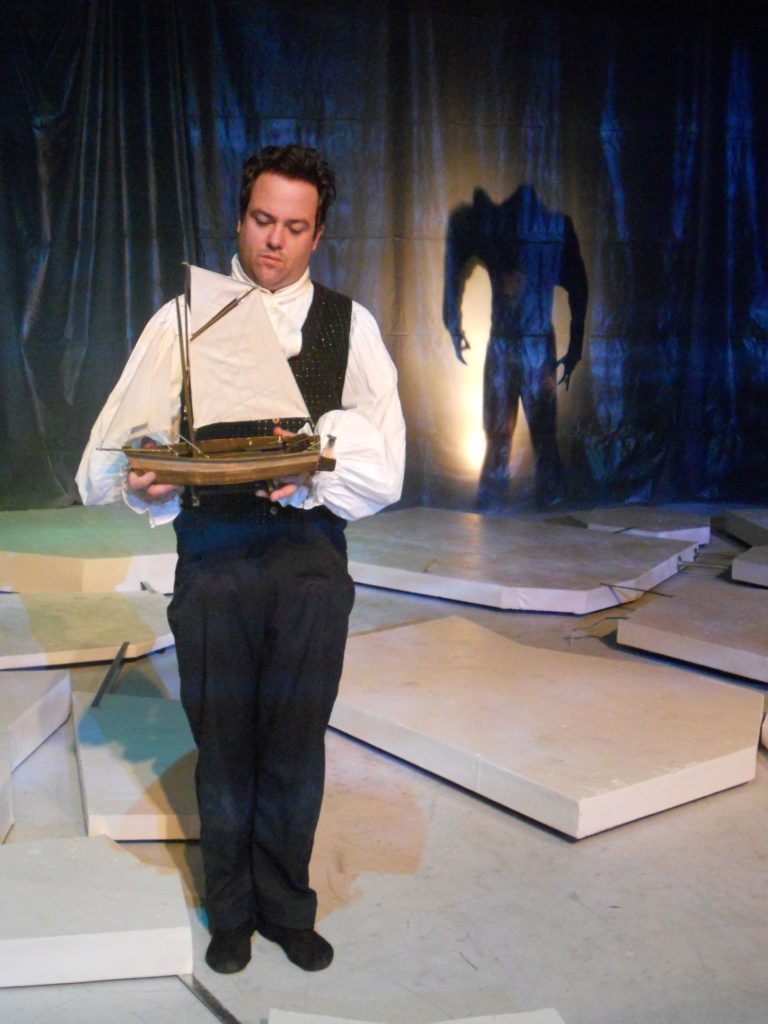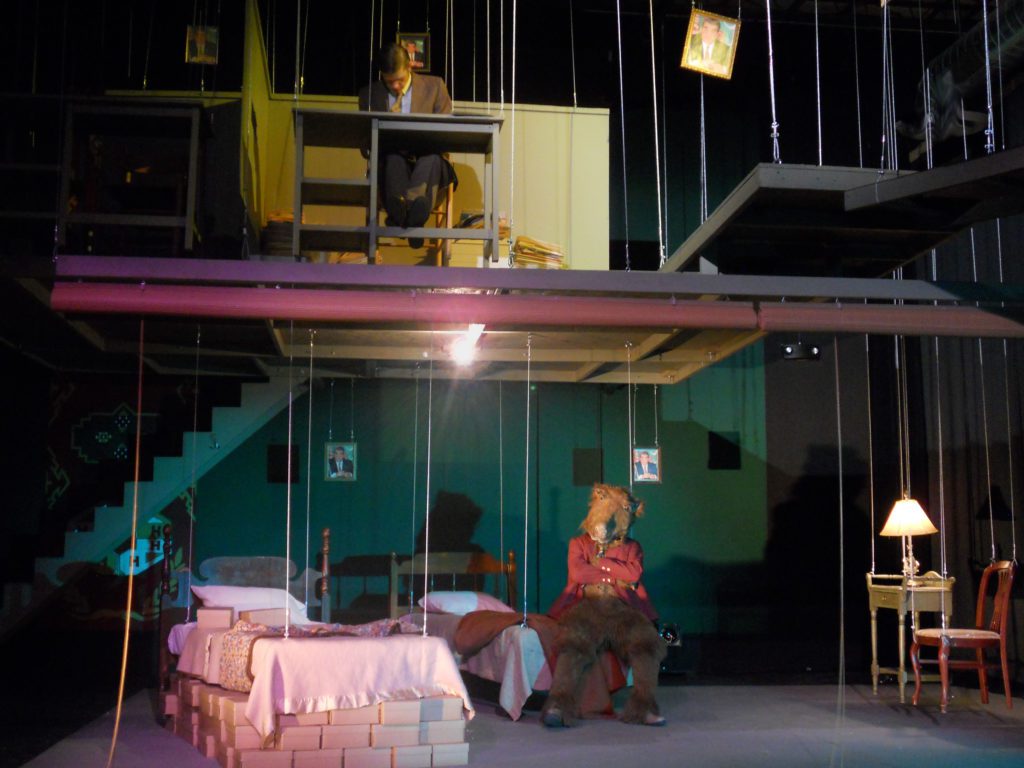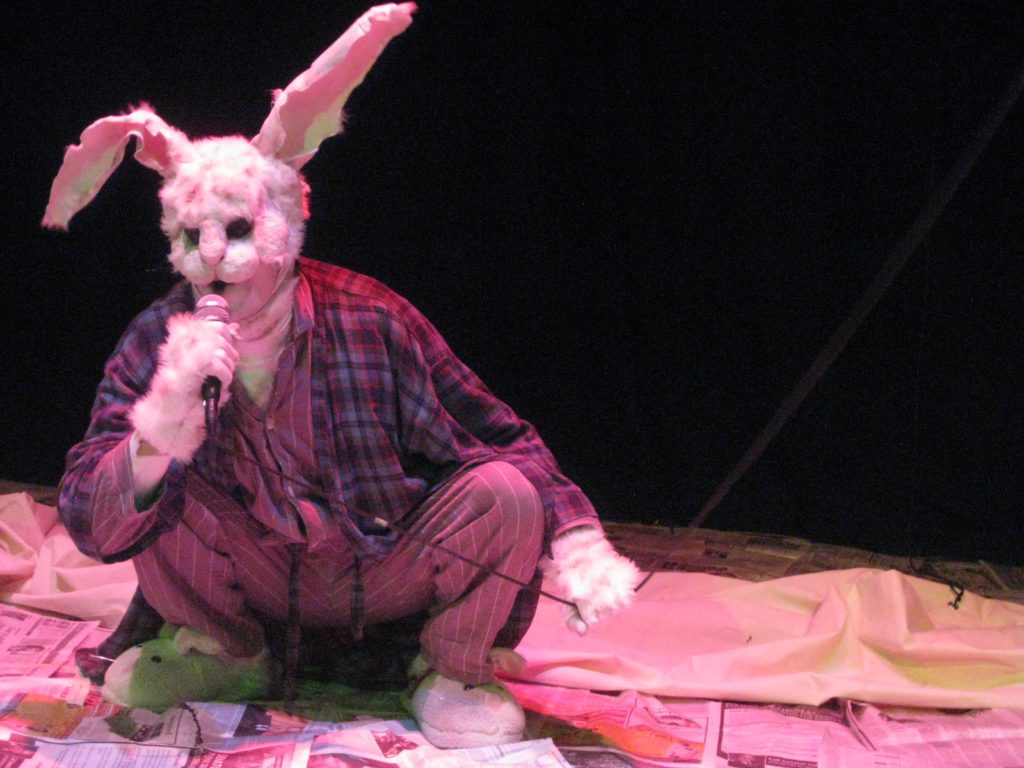The Buntport Theater ensemble has taken audiences down the rabbit hole before, but never to the nether regions of “Jugged Rabbit Stew,” its wonderfully weird if ideologically troubling new musical, written in collaboration with impressive young pop songwriter Adam Stone.
The premise is precocious: A magician’s rabbit has quit the act because he’s depressed. He’s a guy dressed in a bunny suit, down to his cute little floppy-eared slippers. And he’s named Snowball. Cute, right? But in many ways, this ambitious piece culminating Buntport’s ninth season of all-original works is its most disturbing to date.
Imagine, if you will, a man who’s grown so fatalistic that the only joy he gets in life comes from stealing and hoarding items precious to others. Only he’s a bunny. And not some pwetty widdle wabbit, either; he’s the most surly, hateful hare since “Monty Python and the Holy Grail.” Think the Grinch meets Harvey. If Pee-wee had a big adventure in a Kafka nightmare, it would be “Jugged Rabbit Stew.”
The setting, based on the newspapers lining the floor, must be Snowball’s cage. The drunken and cantankerous master of this house, free-range yet clearly trapped, wiles away his days watching home movies of his dead rabbit parents. It’s Erik Edborg in a masterful performance that unnervingly parallels his most recent role as a sotted Eugene O’Neill – only here, he occasionally breaks into song.
Suspended in midair are seemingly random objects covered in sheets – a vacuum cleaner, a toaster, a bike … and a woman, sitting patiently in a hanging rocking chair (Erin Rollman). Her unveiling is the first of many signature examples of Buntport’s uncanny presentational creativity. She’s straight out of a Tennessee Williams play – a fangirl who’s deliriously pleased to be held here in ongoing captivity.
A few parameters: Snowball is the actual magician here. His doting human assistants are Alec the Amazing and All-Powerful, and Mystical Marla. And because of Snowball, neither is whole. Snowball failed to make Alec (Evan Weissman) completely disappear, leaving him with a disembodied arm that now has a mind of its own (played by Brian Colonna). Marla (Hannah Duggan) is saddled with “nasty man legs” because, in a fit of spite, Snowball sawed hers off, and replaced them with a mechanic’s.
He’s cruel and dismissive to them, and yet both have a pathological need to be loved by him. But the ones we love are not always kind to us, Alec aptly says. And when these two sing out of their willingness to change themselves, to disappear into a top hat and emerge as something else in order to be loved by Snowball in return, well, this musical transforms from a charmingly elusive menagerie into one that is painfully, identifiably human. We all, after all, want to be wantable. In the the brilliantly titled song, “Take Me, Break Me, Make Me Something More,” Marla sings of needing to be nicer. Alec sings of needing to be meaner. To win the same man’s affection. Who can’t relate?
But Snowball, as the doted-upon often are, is otherwise consumed. He’s convinced himself that his fate is to twirl on a roasting spit, as did his parents before him, a mere ingredient in someone else’s stew.
This heady talk of fate versus self-determination takes us out of the land of Lewis Carroll and into that most classic and human of storytelling genres: We’re in the land of the Greeks. Of Shakespeare. And you know what happens to the tragic hero there. Only in Snowball, we have a tragic hero who isn’t at all heroic.
How this musical handles Snowball’s epiphany will have audiences asking: Is the finale inevitable … or irresponsible? Those paying the most attention might be left shaken, even indignant, by what it seems to be advocating.
It’s certainly impressively staged, if bloated at more than 2 ½ hours. It’s unnervingly well performed – and yes, that takes into account that none of these actors are trained singers. That’s part of their charm.
Stone’s considerable 17-song score (performed to his taped synthesizer accompaniment) is laden with meaningful, soul-searching lyrics that evoke everything from “Sweeney Todd” to “Les Miserables.” They are often performed in the rapid-fire (and sometimes indecipherable) tempo of, say, REM’s “It’s the End of the World as We Know It.” Fine for a rock concert, but not ideal for a musical where we’re hanging on every word.
This is a stew, all right – ideologically, philosophically and musically. And it’s just like Buntport to leave audiences both dazed and amazed.
-John Moore, May 28, 2010, Denver Post
